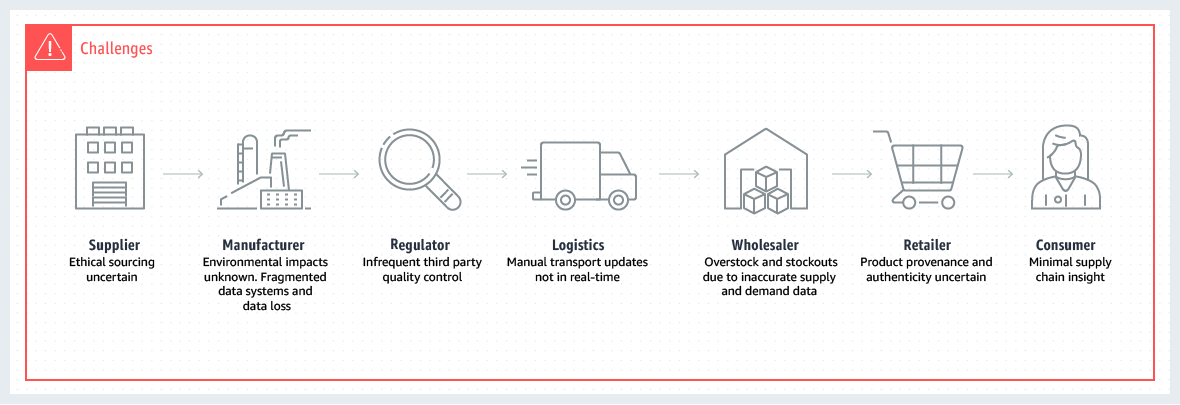Blockchain for Supply Chain: Track and Trace
Gain end-to-end visibility of production with blockchain
Today’s supply chains are global networks that generally include manufacturers, suppliers, logistics companies, and retailers that work together to deliver products to consumers. As modern supply chains continue to expand, they also are becoming more complex and disparate. Typically, traditional supply chains use paper based and disjointed data systems that lead to information silos and make tracking products a time consuming task. Lack of traceability and transparency is an industry-wide challenge that leads to delays, errors, and increased costs. Modern supply chain participants need a unified view of data, while still being able to independently and privately verify transactions such as production and transport updates.
Supply chain solutions built using Amazon Managed Blockchain can provide the end-to-end visibility today’s supply chains need to track and trace their entire production process with increased automation efficiency.
What is Track and Trace?
In the supply chain industry, track and trace refers to the ability to identify the past and present locations of all product inventory, as well as a history of product custody. Track and trace requires following products through a complex journey from raw material, through multiple geographic regions for processing and manufacturing, through regulatory control, and finally, to retailers and consumers. Tracking provenance throughout this journey is crucial to ensuring product authenticity.
Track and trace is often a challenge for today’s supply chains due to outdated paper processes and disjointed data systems that slow down communication. The lack of data compatibility exposes supply chains to problems like visibility gaps, inaccurate supply and demand predictions, manual errors, counterfeiting, and compliance violations.
Track and Trace with Blockchain
Blockchain technology can be used to build applications on which multiple parties can transact directly via a peer-to-peer network, without the need for a central authority to verify transactions. Each network participant has access to a shared ledger that immutably and cryptographically records all transactions, and there is no single network owner.
With blockchain, supply chain companies can document production updates to a single shared ledger, which provides complete data visibility and a single source of truth. Because transactions are always time-stamped and up to date, companies can query a product’s status and location at any point in time. This helps to combat issues like counterfeit goods, compliance violations, delays, and waste. In addition, immediate action can be taken during emergencies (e.g., in the case of product recalls), and regulatory compliance is ensured by the ledger audit trail. Moreover, by combining blockchain with smart technology like Internet of Things, supply chains can automate tracking the conditions of production, transportation, and quality control. Companies can also choose to share track and trace data with their customers as a way to verify product authenticity and ethical supply chain practices.
Featured Customer
“Transparency in supply chains is increasingly important to consumers, who want to know what is in their food and where it comes from. While Nestlé has begun to release information on its supply chains for its 15 key commodities, using blockchain technology enables a more precise tracking,” said Armin Nehzat, Digital Technology Manager, Nestlé Oceania. “With Amazon Managed Blockchain, we are able to set up our Hyperledger Fabric network and easily invite our partners to collaborate in our supply chain transparency efforts. Amazon Managed Blockchain will enable our customers to track their products on the blockchain from the farm all the way through to consumption.”
Armin Nehzat,
Digital Technology Manager Nestlé Oceania

Traditional Supply Chains

Supply Chains with Blockchain

Industry Use Cases

Food and Agriculture
Track products throughout the supply chain to respond quickly in the event of food safety emergencies. Differentiate your brand from the rest of the market and empower customers by providing detailed food supply chain insights. Compensate small farmers quickly and equitably.

Pharmaceuticals
Reduce counterfeit medicines. Minimize patient risk by reacting quickly to medication recalls, and reduce overall pharmaceutical costs.

Manufacturing
Inform consumers about the provenance of their clothes and shoes to demonstrate authenticity and ethical practices. Track spare auto parts and streamline auto safety recall processes to save money and reduce the number of affected customers.

Mining
Ensure ethical sourcing and authenticity of raw materials. Accurately track environmental impacts of production, revealing new opportunities for sustainability.
Track and Trace on AWS with Amazon Managed Blockchain
Amazon Managed Blockchain is a fully managed service that allows you to set up and manage a scalable blockchain network with just a few clicks. Amazon Managed Blockchain eliminates the overhead required to create the network, and automatically scales to meet the demands of thousands of applications running millions of transactions. Once your network is up and running, Managed Blockchain makes it easy to manage and maintain your blockchain network. It manages your certificates and lets you easily invite new members to join the network. Get started building a blockchain network in minutes with AWS on Amazon Managed Blockchain here.


